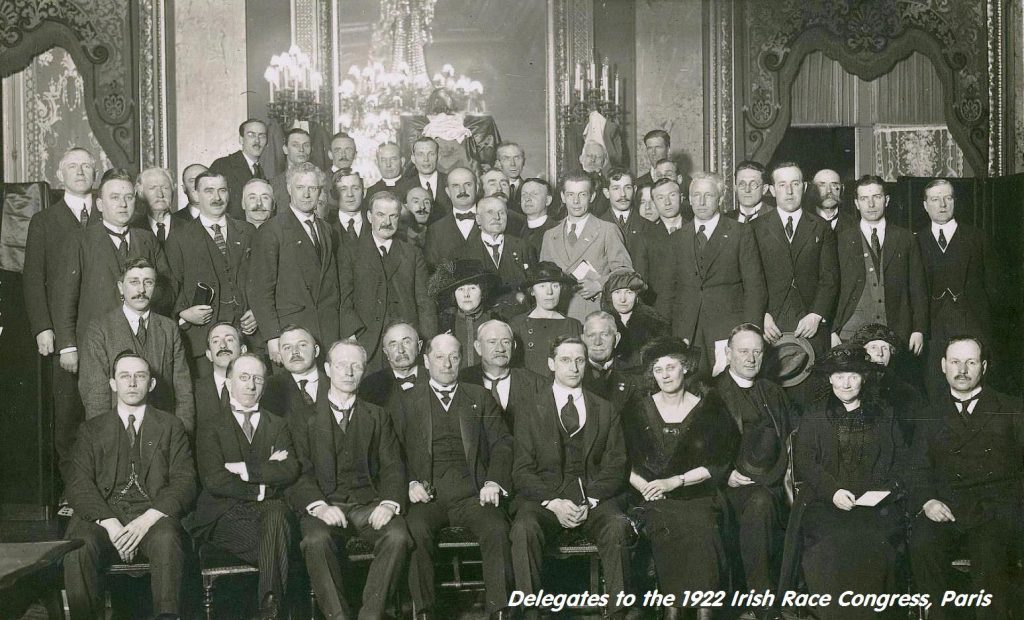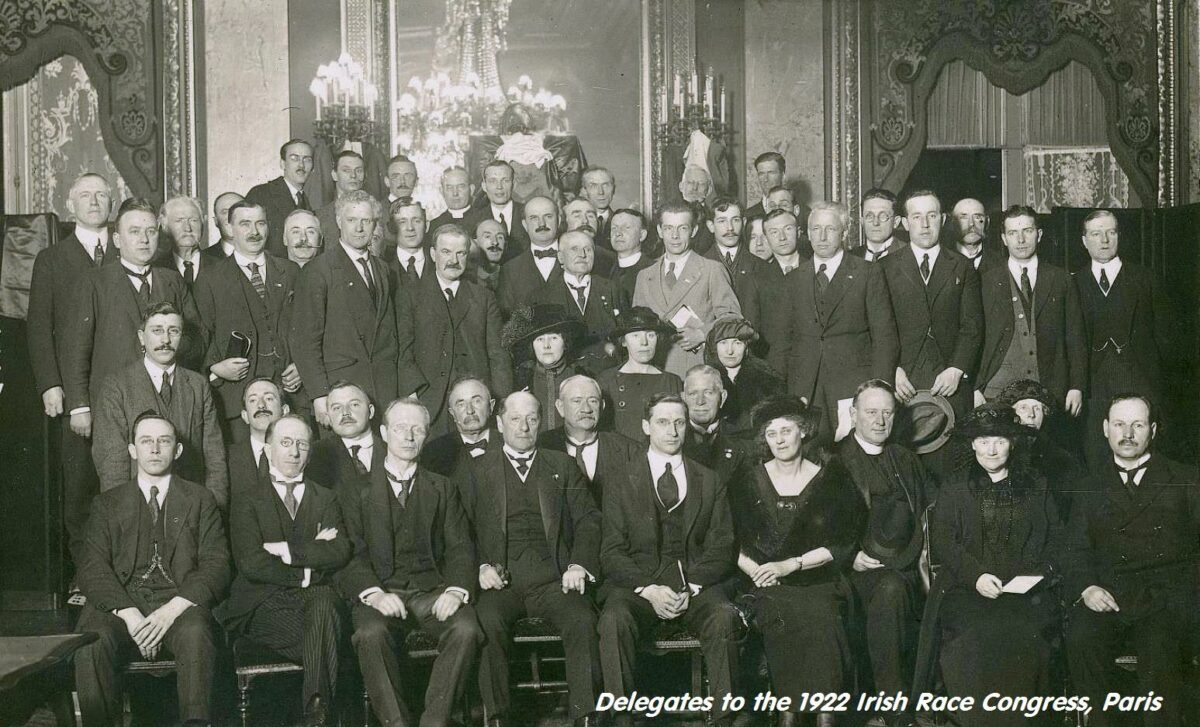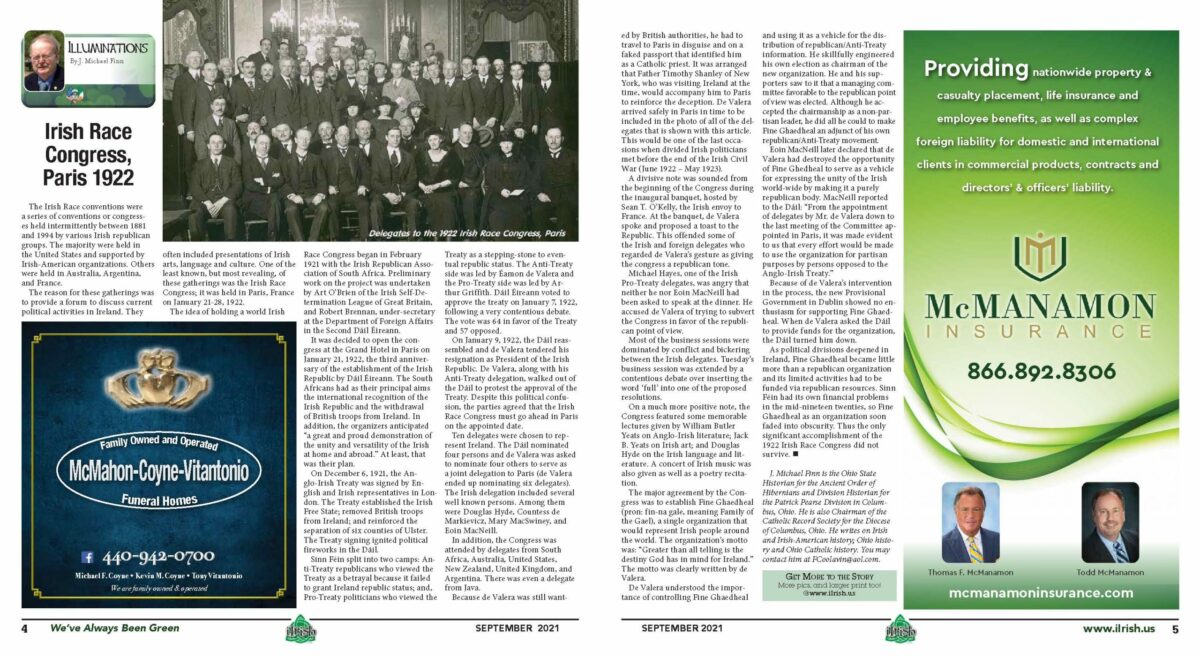
Illuminations: Irish Race Congress, Paris 1922
By: J. Michael Finn
The Irish Race conventions were a series of conventions or congresses held intermittently between 1881 and 1994 by various Irish republican groups. The majority were held in the United States and supported by Irish-American organizations. Others were held in Australia, Argentina, and France.

The reason for these gatherings was to provide a forum to discuss current political activities in Ireland. They often included presentations of Irish
arts, language and culture. One of the least known, but most revealing, of these gatherings was the Irish Race Congress; it was held in Paris, France on January 21-28, 1922.
The idea of holding a world Irish Race Congress began in February 1921 with the Irish Republican Association of South Africa. Preliminary work on the project was undertaken by Art O’Brien of the Irish Self-Determination League of Great Britain, and Robert Brennan, under-secretary at the Department of Foreign Affairs in the Second Dáil Éireann.
It was decided to open the congress at the Grand Hotel in Paris on January 21, 1922, the third anniversary of the establishment of the Irish Republic by Dáil Éireann. The South Africans had as their principal aims the international recognition of the Irish Republic and the withdrawal of British troops from Ireland. In addition, the organizers anticipated “a great and proud demonstration of the unity and versatility of the Irish at home and abroad.” At least, that was their plan.
Irish Free State
On December 6, 1921, the Anglo-Irish Treaty was signed by English and Irish representatives in London. The Treaty established the Irish Free State; removed British troops from Ireland; and reinforced the separation of six counties of Ulster. The Treaty signing ignited political fireworks in the Dáil.
Sinn Féin split into two camps: Anti-Treaty republicans who viewed the Treaty as a betrayal because it failed to grant Ireland republic status; and, Pro-Treaty politicians who viewed the Treaty as a stepping-stone to eventual republic status. The Anti-Treaty side was led by Éamon de Valera and the Pro-Treaty side was led by Arthur Griffith. Dáil Éireann voted to approve the treaty on January 7, 1922, following a very contentious debate. The vote was 64 in favor of the Treaty and 57 opposed.
On January 9, 1922, the Dáil reassembled and de Valera tendered his resignation as President of the Irish Republic. De Valera, along with his Anti-Treaty delegation, walked out of the Dáil to protest the approval of the Treaty. Despite this political confusion, the parties agreed that the Irish Race Congress must go ahead in Paris on the appointed date.
Ten delegates were chosen to represent Ireland. The Dáil nominated four persons and de Valera was asked to nominate four others to serve as a joint delegation to Paris (de Valera ended up nominating six delegates). The Irish delegation included several well known persons. Among them were Douglas Hyde, Countess de Markievicz, Mary MacSwiney, and Eoin MacNeill.
In addition, the Congress was attended by delegates from South Africa, Australia, United States, New Zealand, United Kingdom, and Argentina. There was even a delegate from Java.
Because de Valera was still wanted by British authorities, he had to travel to Paris in disguise and on a faked passport that identified him as a Catholic priest. It was arranged that Father Timothy Shanley of New York, who was visiting Ireland at the time, would accompany him to Paris to reinforce the deception. De Valera arrived safely in Paris in time to be included in the photo of all of the delegates that is shown with this article. This would be one of the last occasions when divided Irish politicians met before the end of the Irish Civil War (June 1922 – May 1923).
A divisive note was sounded from the beginning of the Congress during the inaugural banquet, hosted by Sean T. O’Kelly, the Irish envoy to France. At the banquet, de Valera spoke and proposed a toast to the Republic. This offended some of the Irish and foreign delegates who regarded de Valera’s gesture as giving the congress a republican tone.
Michael Hayes, one of the Irish Pro-Treaty delegates, was angry that neither he nor Eoin MacNeill had been asked to speak at the dinner. He accused de Valera of trying to subvert the Congress in favor of the republican point of view.
Most of the business sessions were dominated by conflict and bickering between the Irish delegates. Tuesday’s business session was extended by a contentious debate over inserting the word ‘full’ into one of the proposed resolutions.
William Butler Yeats
On a much more positive note, the Congress featured some memorable lectures given by William Butler Yeats on Anglo-Irish literature; Jack B. Yeats on Irish art; and Douglas Hyde on the Irish language and literature. A concert of Irish music was also given as well as a poetry recitation.
The major agreement by the Congress was to establish Fine Ghaedheal (pron: fin-na gale, meaning Family of the Gael), a single organization that would represent Irish people around the world. The organization’s motto was: “Greater than all telling is the destiny God has in mind for Ireland.” The motto was clearly written by de Valera.
De Valera understood the importance of controlling Fine Ghaedheal and using it as a vehicle for the distribution of republican/Anti-Treaty information. He skillfully engineered his own election as chairman of the new organization. He and his supporters saw to it that a managing committee favorable to the republican point of view was elected. Although he accepted the chairmanship as a non-partisan leader, he did all he could to make Fine Ghaedheal an adjunct of his own republican/Anti-Treaty movement.
Eoin MacNeill later declared that de Valera had destroyed the opportunity of Fine Ghedheal to serve as a vehicle for expressing the unity of the Irish world-wide by making it a purely republican body. MacNeill reported to the Dáil: “From the appointment of delegates by Mr. de Valera down to the last meeting of the Committee appointed in Paris, it was made evident to us that every effort would be made to use the organization for partisan purposes by persons opposed to the Anglo-Irish Treaty.”
Because of de Valera’s intervention in the process, the new Provisional Government in Dublin showed no enthusiasm for supporting Fine Ghaedheal. When de Valera asked the Dáil to provide funds for the organization, the Dáil turned him down.
As political divisions deepened in Ireland, Fine Ghaedheal became little more than a republican organization and its limited activities had to be funded via republican resources. Sinn Féin had its own financial problems in the mid-nineteen twenties, so Fine Ghaedheal as an organization soon faded into obscurity. Thus the only significant accomplishment of the 1922 Irish Race Congress did not survive.
*J. Michael Finn is the Ohio State Historian for the Ancient Order of Hibernians and Division Historian for the Patrick Pearse Division in Columbus, Ohio. He is also Chairman of the Catholic Record Society for the Diocese of Columbus, Ohio. He writes on Irish and Irish-American history; Ohio history and Ohio Catholic history. You may contact him at [email protected].


Monthly newsmagazine serving people of Irish descent from Cleveland to Clearwater. We cover the movers, shakers & music makers each and every month.
Since our 2006 inception, iIrish has donated more than $376,000 to local and national charities.
GET UPDATES ON THE SERIOUS & THE SHENANIGANS!